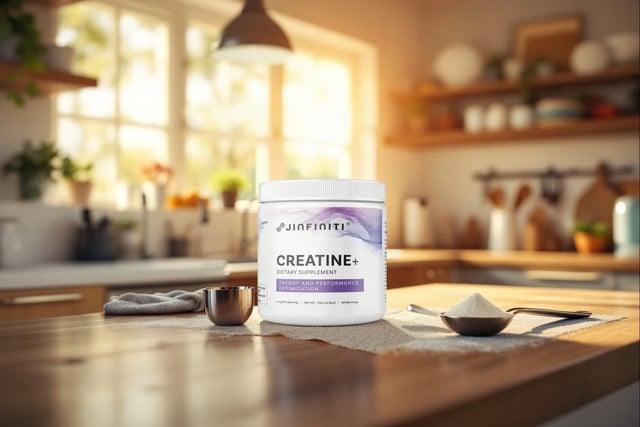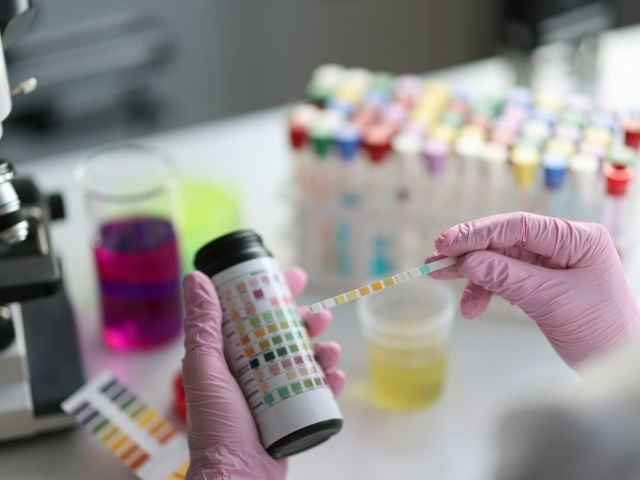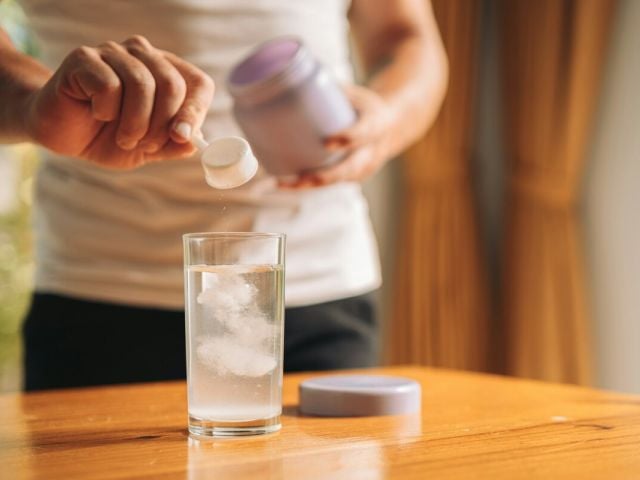
Creatine FAQs for Women: Weight Gain, Menopause, Pregnancy
You’ve probably heard mixed messages about creatine supplementation. Some say it’s just for bodybuilders. Others worry about bloating and weight gain.
The truth is far more interesting. Recent research shows that creatine for women offers unique advantages that extend well beyond the gym. Women actually have 70-80% lower natural creatine stores than men, making supplementation potentially more beneficial.
This guide answers your most pressing questions about creatine. We’ll explore weight concerns, pregnancy safety, and how hormones affect your results.
Key Takeaways
- Weight gain from creatine is water in your muscles, not fat – The 1-2 pounds you might gain in the first week comes from beneficial muscle hydration that creates definition, not bloating.
- Women may benefit more than men from creatine – You naturally store 70-80% less creatine than men, creating greater opportunity for improvements in energy and performance.
- Benefits extend far beyond the gym – Research links adequate creatine intake to better reproductive health, reduced irregular periods, and enhanced brain function during hormonal changes.
- Safe across most life stages – Studies show excellent safety profiles for healthy women, though pregnancy requires healthcare provider consultation.
- Simple dosing works best – Start with 3-5 grams daily, or use a 5-day loading phase at 0.3g per kg body weight, then maintain with daily consistent use.
Does Creatine Cause Unwanted Weight Gain in Women?
Let’s address the elephant in the room first. You’re worried about the scale going up, right?
Here’s what actually happens when you start taking creatine. Your muscles store more water1, which shows up as weight gain initially. This isn’t fat gain or bloating under your skin, despite common creatine myths.
The water goes directly into your muscle cells. This creates a fuller, more defined look rather than puffiness. Think of it like inflating a balloon inside your muscles.
The Real Numbers Behind Weight Changes
Most women see 1-2 pounds of water weight within the first week. This stabilizes quickly as your body adapts to higher creatine levels.
| Timeline | What Happens | Why It Matters |
|---|---|---|
| Week 1 | 1-2 lbs water weight gain | Normal muscle hydration response |
| Week 2-4 | Weight stabilizes | Body adapts to new creatine levels |
| Month 2+ | Possible lean mass gains | Enhanced muscle protein synthesis |
Long-term weight changes reflect something entirely different. Studies show increased lean muscle mass2 rather than fat accumulation. Elite female handball players gained weight but decreased body fat percentage after 12 weeks of creatine use.
Your clothes might fit better even if the scale shows higher numbers. More muscle tissue burns more calories at rest, supporting your metabolism.
How Does Creatine for Women Differ from Men’s Needs?
Women’s bodies handle creatine differently than men’s. This isn’t just about size differences.
Your natural creatine stores sit at about 70-80% lower3 than men’s baseline levels. Your liver, kidneys, and brain produce creatine from amino acids, but women make less overall.
Hormones play a huge role too. Estrogen directly influences how your body uses creatine and rebuilds energy stores. During your menstrual cycle, creatine levels rise and fall with estrogen.
Why This Matters for Your Results
Lower starting levels mean you have more room for improvement. When you supplement with creatine, you’re filling a bigger gap than men typically experience.
Your hormonal fluctuations create additional opportunities. The effects of creatine may be more noticeable during certain cycle phases when your natural stores dip lowest.
This explains why some women see dramatic improvements in energy and performance. You’re not just adding to already high stores – you’re correcting a significant deficit.
Benefits of Creatine for Women Beyond Exercise
The benefits of creatine extend far beyond your workout routine. Recent research reveals surprising advantages for women’s health.
Reproductive Health Support
A large study of 4,522 women4 found fascinating connections between dietary creatine intake and reproductive health. Women consuming adequate creatine showed 25% lower risk of irregular periods.
The same study linked proper creatine intake to fewer pregnancy complications. Women meeting recommended levels faced reduced risks of fetal growth issues and pelvic infections.
Brain Health and Cognitive Function
Your brain demands enormous amounts of energy. It relies heavily on the creatine system for rapid energy production during intense mental tasks.
Research suggests5 that creatine supplementation may help with “brain fog” many women experience. This could be especially relevant during hormonal changes when cognitive complaints often increase.
The supplement may support neurotransmitter production and protect brain cells from oxidative stress. Some studies indicate creatine might be even more effective for brain health in women than men.
Can Women Take Creatine During Their Menstrual Cycle?
Yes, and timing might actually matter more than you think. Your menstrual cycle affects how your body responds to creatine supplementation.
Estrogen influences creatine metabolism6 throughout your cycle. Creatine levels naturally fluctuate, reaching their lowest points when estrogen drops during the early follicular and luteal phases.
Performance Benefits Across Cycle Phases
Research shows creatine may provide the greatest benefits during your luteal phase. This is when progesterone peaks and performance typically declines.
One study found a 5.8% improvement in fatigue resistance when women used creatine during the high hormone phase. The placebo group showed minimal changes during the same period.
Your energy levels and sleep quality often dip during certain cycle phases. Creatine supplementation may help counteract declines in energy and even sleep deprivation.
Practical Cycle Considerations
You don’t need to time your creatine perfectly with your cycle. Daily consistent use appears most practical for long-term benefits.
However, starting supplementation during your luteal phase might help you notice benefits more quickly. This is when your natural energy systems face the most stress.
Is Creatine Safe During Pregnancy?
Pregnancy safety represents an evolving area of research. Current evidence suggests creatine appears well-tolerated in healthy adults7, but pregnancy-specific data remains limited.
Your developing baby depends entirely on your creatine supply. The placenta transfers creatine from your bloodstream to support fetal brain development and energy metabolism.
What the Research Shows
Animal studies and preliminary human research suggest maternal creatine supplementation may provide neuroprotective benefits for developing brains8. This could be especially important for pregnancies at risk of complications.
A survey9 found that 95% of pregnant women would consider creatine supplementation if their healthcare provider recommended it. Most indicated that potential weight gain wouldn’t deter them.
Important Safety Considerations
The osmotic properties of creatine warrant consideration during pregnancy. Your body naturally retains more fluid during pregnancy, and creatine increases water retention in muscles.
Always consult your healthcare provider before starting any supplement during pregnancy. They can assess your individual risk factors and monitor your progress.
Should Women Take Creatine During Menopause?
Menopause creates unique challenges where creatine supplementation may provide substantial benefits. You face increased risk of muscle loss, bone density decline, and cognitive changes.
Research in postmenopausal women shows that high-dose creatine supplementation combined with resistance training produces significant improvements in muscle size and function10.
The Muscle Loss Challenge
You can lose up to 20% of your muscle mass within five years after your final period. This accelerated loss impacts your strength, metabolism, and independence.
Creatine supplementation may help offset this decline. Studies show improvements in skeletal muscle when women use approximately 10 grams daily alongside resistance training.
Bone Health Benefits
While creatine doesn’t significantly improve bone density, it enhances bone quality. Women receiving creatine showed improvements in bone’s resistance to bending and compression11.
These quality improvements may translate to reduced fracture risk. This offers a complementary approach to traditional bone health strategies.
| Menopause Challenge | How Creatine May Help |
|---|---|
| Muscle loss | Enhanced protein synthesis |
| Bone fragility | Improved bone quality markers |
| Cognitive changes | Better brain energy metabolism |
| Mood fluctuations | Support for neurotransmitter function |
How Do Creatine Supplements Support Brain Health?
Your brain consumes about 20% of your daily calories despite being only 2% of your body weight. It needs constant energy to maintain neural function and cognitive performance.
The creatine-phosphocreatine system provides rapid energy bursts when your brain cells fire intensely. This becomes especially important during challenging mental tasks.
Cognitive Performance Benefits
Studies suggest that creatine supplementation may improve working memory, processing speed, and overall cognitive function12. These effects appear particularly pronounced in women.
Your lower baseline creatine stores create more opportunity for cognitive enhancement. When you supplement with creatine, you’re providing your brain with more energy reserves.
Mood and Mental Health
Creatine may support mood stability by maintaining optimal brain energy levels. This could be especially relevant during hormonal transitions when mood changes often occur.
The supplement supports neurotransmitter synthesis and protects brain cells from oxidative damage. These mechanisms may contribute to better emotional regulation and stress resilience.
What’s the Right Creatine Dose for Women?
Effective creatine dosing follows established protocols while considering your typically lower body weight and muscle mass compared to men.
Loading Phase Protocol
The traditional approach involves a loading phase of 0.3 grams per kilogram of body weight daily for five days. For a 130-pound woman, this equals about 18 grams daily.
Split this into 3-4 doses throughout the day. Take each dose with meals to optimize absorption and minimize any stomach discomfort.
Maintenance Dosing
After loading, switch to maintenance dosing of 3-5 grams daily. This represents about 0.03 grams per kilogram of body weight for most women.
| Body Weight | Loading Phase (5 days) | Maintenance Phase |
|---|---|---|
| 110 lbs (50 kg) | 15g daily | 3-4g daily |
| 130 lbs (60 kg) | 18g daily | 4-5g daily |
| 150 lbs (70 kg) | 21g daily | 5-6g daily |
Alternative Approach
You can skip the loading phase entirely. Use the maintenance dose consistently for 4-6 weeks to achieve muscle saturation more gradually.
This approach may prove more practical if you’re concerned about rapid weight changes. The end result is the same – just takes longer to reach optimal levels.
For a more detailed breakdown, check out our beginner’s guide to creatine.
How Should Women Take Creatine for Best Results?
Timing and combining creatine with other nutrients can optimize your results. Simple strategies make a significant difference in absorption and effectiveness.
Optimal Timing Strategies
Take creatine with carbohydrates or a carbohydrate-protein combination. Insulin helps transport creatine into your muscle cells more efficiently.
Post-workout timing may offer slight advantages. Your muscles are primed to absorb nutrients during the recovery window after exercise.
Hydration Considerations
Maintain adequate hydration during creatine supplementation. The supplement increases water retention in muscle cells, so your overall fluid needs increase slightly.
Aim for at least 8-10 glasses of water daily. This supports optimal cellular function and minimizes any temporary discomfort from initial water retention.
Cycle Timing Considerations
While daily consistency matters most, some research suggests greater benefits when starting during your luteal phase. This coincides with when your natural creatine levels typically dip.
Don’t stress about perfect timing. Regular daily use provides the foundation for long-term benefits regardless of cycle phase.
What Type of Creatine Supplement Should Women Choose?

Creatine monohydrate represents the gold standard for supplementation. It’s the most extensively researched form with the strongest safety profile.
Why Creatine Monohydrate Wins
Regulatory authorities worldwide find insufficient evidence of adverse effects to warrant dosage restrictions for creatine monohydrate5. Decades of research support its safety and effectiveness.
Other forms of creatine often cost more but don’t provide superior benefits. Marketing claims about “better absorption” rarely hold up under scientific scrutiny.
Quality Considerations
Choose third-party tested products to ensure purity and potency. Look for NSF or USP certification on the label.
Avoid products with unnecessary additives or proprietary blends. Pure creatine monohydrate powder offers the best value and flexibility for dosing.
The powder form allows you to adjust your gram of creatine intake precisely. You can mix it with water, juice, or add it to smoothies.
Enhanced Formulations for Women
Some companies recognize that women may benefit from enhanced creatine formulations. Jinfiniti’s Creatine + ATP combines 4g of creatine monohydrate with 400mg of disodium ATP to support both physical and mental performance.
This approach acknowledges that women often seek cognitive benefits alongside physical improvements. The addition of ATP may provide extra support for cellular energy production throughout the body and brain.
Quick Review
Creatine supplementation in women offers remarkable benefits across multiple life stages. Your naturally lower creatine stores create unique opportunities for improvement in energy, performance, and overall health.
The weight gain concerns that deter many women reflect beneficial adaptations rather than unwanted fat storage. Initial water retention stabilizes quickly, while long-term changes support lean muscle development.
From reproductive health to cognitive function, the effects of creatine extend well beyond athletic performance. Whether you’re managing menstrual cycle fluctuations, considering pregnancy, or navigating menopause, creatine may provide valuable support.
The safety profile remains excellent when you choose quality creatine monohydrate and follow proper dosing guidelines. Start with the standard protocols and adjust based on your individual response and goals.
Consider creatine supplementation as an investment in your long-term health and vitality. The science supports its use across the female lifespan, offering benefits that compound over time with consistent use.
Referenced Sources
- https://pmc.ncbi.nlm.nih.gov/articles/PMC7871530/ ↩︎
- https://www.mdpi.com/1660-4601/19/1/393 ↩︎
- https://www.mdpi.com/2072-6643/13/3/877 ↩︎
- https://onlinelibrary.wiley.com/doi/10.1002/fsn3.4135 ↩︎
- https://www.mdpi.com/2072-6643/17/1/95 ↩︎
- https://www.mdpi.com/2072-6643/15/16/3567 ↩︎
- https://pmc.ncbi.nlm.nih.gov/articles/PMC4007139/ ↩︎
- https://pmc.ncbi.nlm.nih.gov/articles/PMC10657457/ ↩︎
- https://onlinelibrary.wiley.com/doi/10.1111/jpc.14410_52 ↩︎
- https://pubmed.ncbi.nlm.nih.gov/33800439/ ↩︎
- https://pmc.ncbi.nlm.nih.gov/articles/PMC10487398/ ↩︎
- https://pmc.ncbi.nlm.nih.gov/articles/PMC7998865/ ↩︎

Get weekly health insights and exclusive offers by joining our newsletter.











